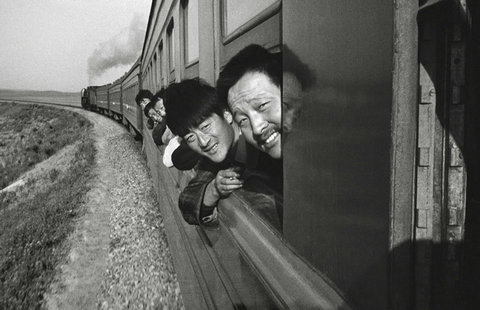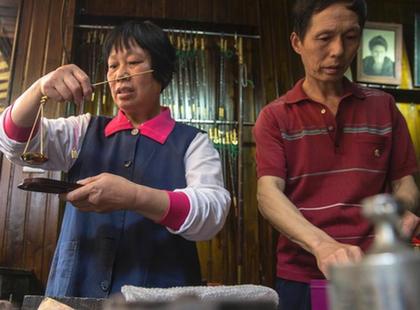Ho Feng Shan: A man of compassion, courage
Updated: 2015-04-24 11:18
By May Zhou(China Daily USA)
|
||||||||
 |
|
A Shanghai visa issued by Dr. Ho Feng Shan, serial number 3,639 |
First visa recipient
The first visa recipient Ho Manli tracked down was the late Eric Goldstaub of Toronto, who did go to Shanghai.
Goldstaub told her he visited 50 foreign consulates in Vienna before obtaining 20 visas at the Chinese Consulate. It was to a place, Goldstaub recounted, most Austrian Jews had never dreamt of going to, much less heard of. When the anti-Jewish program known as Kristallnacht erupted in Germany and Austria on November 9-10, 1938, both Goldstaub and his father were arrested and imprisoned, but with the Shanghai visas as proof of emigration, they were released within days and embarked on their journey to Shanghai.
"On Kristallnacht, my father himself faced down the Gestapo at gunpoint to help his Jewish friends, the Rosenbergs," Ho Manli said. "He had provided the Rosenbergs with visas to Shanghai and had come to their home to see them off. Because of my father's intervention, Mr. Rosenberg was released from detention, and the family was able to leave Vienna safely for Shanghai."
Other families, such that of Karl Lang, did not have such personal intervention on Kristallnacht. Lang's daughters, Marion Alflen and Susie Margalit, later told Ho Manli that their father was arrested and deported to Dachau concentration camp. He was only released after their mother was able to obtain a Shanghai visa and present it to Nazi authorities as proof of emigration. The Lang family left Austria for England and finally made their way to the United States.
In the meantime, Chen Jie, the Chinese ambassador to Berlin and Ho's direct superior, was concerned that Ho's issuing of visas on such a large scale would damage Sino-German relations. He ordered Ho to desist, but Ho disobeyed the order and continued to issue visas. Ho was later punished for his disobedience with a demerit in his record.
In early 1939, the Consulate building - on which the plaque was placed in his honor last week - was confiscated from Ho by the Nazis. He was forced to relocate to smaller quarters at his own expense. He remained undaunted throughout, Ho Manli said.
Ho Manli says that she is often asked how many visas were issued and how many lives were saved under her father's watch.
"After more than seven decades, there is no way of finding exact figures," she said. "During his lifetime, my father said very little about his humanitarian efforts, and it was only after his death that this long buried history came to light."
According to Ho Manli, the best that can be determined is that the visas numbered in the thousands. Based on the highest serial numbers of visas that she has found, close to 4,000 were issued about a year after the Anschluss. How many more were issued in the remaining months before the outbreak of World War II on September 1, 1939, when routes of escape began to shut down, is hard to determine, she added.
- Fourth generation of 'face-kini' soon to hit beach in Qingdao
- Tibetan town captures photos of their 'panda deity'
- 600 arrested in Beijing's vice crackdown
- Building collapse in Guizhou caused by landslide: govt
- Xi welcomes Japan delegation but warns against historical distortion
- Chinese Vice-Premier stresses flood control
- Ireland becomes first country to vote for equal marriage: PM
- Gov't declares high alert after landslide blocks Kali Gandaki River in Nepal
- Restorers give shape to Pompeii victims
- China, Russia end joint naval exercises
- Japanese visit underlines thaw in relations
- China, Brazil cooperation can ride 'winds and tides'

 Premier talks with Chinese entrepreneurs in Peru
Premier talks with Chinese entrepreneurs in Peru
 Tourists enjoy themselves at Mingsha Hill desert
Tourists enjoy themselves at Mingsha Hill desert
 Colombia: A birdwatcher's paradise
Colombia: A birdwatcher's paradise
 Journey of a migrant girl from village to ad world
Journey of a migrant girl from village to ad world
 Photographer captures Chinese on the train
Photographer captures Chinese on the train
 Hou Hsiao-Hsien's The Assassin premieres in Cannes
Hou Hsiao-Hsien's The Assassin premieres in Cannes
 Top 10 highest-paid white-collar jobs in China
Top 10 highest-paid white-collar jobs in China
 The dying craft of balance scales
The dying craft of balance scales
Most Viewed
Editor's Picks

|

|

|

|

|

|
Today's Top News
Chinese premier arrives in Chile for official visit
Expansion of free trade possible on Chile visit
Chilean president sees promising prospects for relations with China
Chinese premier encourages firms to upgrade cooperation with Peru
China, Peru agree on feasibility study on transoceanic railway
China manufactures first
car for US market
Wisconsin hopes to make cheeseheads in China
China, Peru to diversify trade focus
US Weekly

|

|






